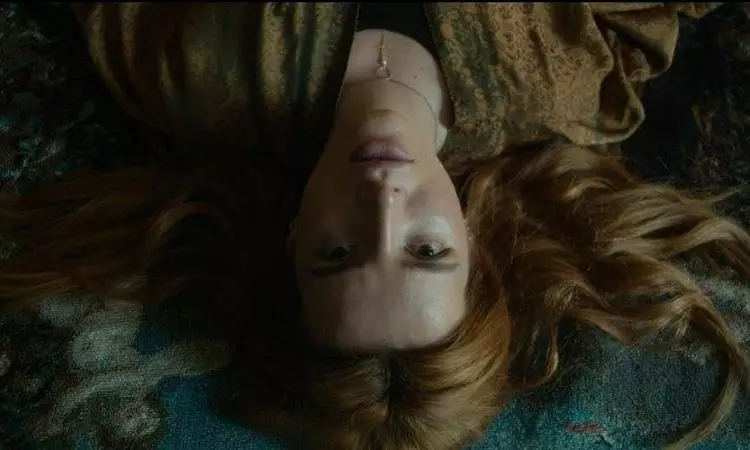In the opening scenes of *Saint Clare*, we meet the troubled yet fiercely determined protagonist, Clare Bleecker, portrayed by Bella Thorne. As she lies in bed, mirroring an inverted version of the iconic Jesus Christ pose, she delivers a haunting mantra that shapes her character throughout the film: “Everything I have said and done has been in the hands of God. I was born to do this. I am not afraid.” This declaration not only sets the film’s tone but also introduces us to Clare’s complex psyche—a blend of religious fervor, desperation, and a profound sense of duty towards intervening in male violence. The echoing words of Joan of Arc, whom Clare idolizes, serve as a backdrop against which to analyze her actions, blurring the line between sanctity and sociopathy.
Clare encapsulates an enigma, embodying both the ideals of a saintly protectress and the harrowing reality of being a sociopathic killer. Her admiration for Joan of Arc, a historical figure known for her defiance against male dominance, elevates Clare’s self-image as a warrior of sorts. However, as highlighted by various characters, including her grandmother Gigi and would-be assailant Joe, Clare’s violent tendencies might lead her to a tragic fate that parallels Joan’s own demise. The contrasting perceptions of Clare—as a heroine fighting for justice and a flawed individual succumbing to violence—serve as a compelling exploration of female agency within oppressive societal structures.
Gigi, played by Rebecca De Mornay, serves as both a maternal figure and a sounding board for Clare’s spiritual and moral conflicts. As a character steeped in the ideals of liberation, Gigi seeks to help Clare understand her identity beyond the chaos. However, Clare’s unreliability and moral ambiguity often create a rift between them, leading to a compelling dynamic fraught with tension. The duality of Clare’s character is equivalent to a complex web layered with relationships that test her values. Her conversations with the ghost of Mailman Bob, who serves as a manifestation of Clare’s conscience, further complicate her psyche, emphasizing her struggles with guilt and justification for her actions.
As Clare navigates her small-town environment, she wrestles with the desire to assimilate and conform to societal expectations while also being pursued by the specter of her violent past. The film’s portrayal of teenage life—highlighted through Clare’s attempts to engage in “acceptable” trouble—positions her in an existential dilemma. The quest for normalcy often teeters on the edge of insanity, and her efforts to evade the attention of the local police detective Rich Timmons, played by Ryan Phillippe, underscore the constant pressure to mask her darkest impulses. Clare’s story becomes a chilling representation of the struggle many women face in balancing societal norms while confronting the perils of a masculine-dominated world.
At its core, *Saint Clare* challenges viewers to confront the harsh realities of gender-based violence and societal neglect. Clare’s pivotal question—“How do so many women go unnoticed?”—resonates far beyond the fabric of the film, serving as a critique of a society that often overlooks the plight of women. This profound inquiry reflects the feminist lens through which the story unfolds, as Clare embarks upon a personal vendetta against the culture of silence surrounding female disappearances. The film becomes a tapestry woven with themes of empowerment, accountability, and martyrdom, inviting audiences to reflect on the blurred boundaries between heroism and villainy.
Cinematographically, *Saint Clare* employs striking giallo-inspired hues to visually narrate Clare’s internal struggles and her turbulent relationship with morality. The stylistic choices made by director Mitzi Peirone complement the narrative’s multifaceted nature. The interplay between light and shadow accentuates the film’s psychological depth while drawing parallels to Clare’s internal conflict—a relentless battle between her sense of justice and the implications of her own actions. Through Peirone’s lens, viewers witness a woman trapped in a harrowing odyssey where every decision weighs heavily on her conscience.
Ultimately, *Saint Clare* serves as an intricate exploration of the complexities of awareness, agency, and moral ambiguity within a patriarchal society. Clare Bleecker’s journey encapsulates the fight for autonomy while navigating a world fraught with peril and injustice. The film unearths uncomfortable truths about societal responsibility towards women, revealing the latent power within victims who choose to reclaim their narrative. As Clare emerges from her harrowing experiences, sullied but sanctified, viewers are left to ponder the darker realities of female power and the lengths one might go to in pursuit of justice.

